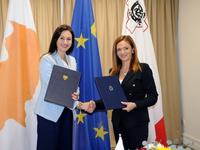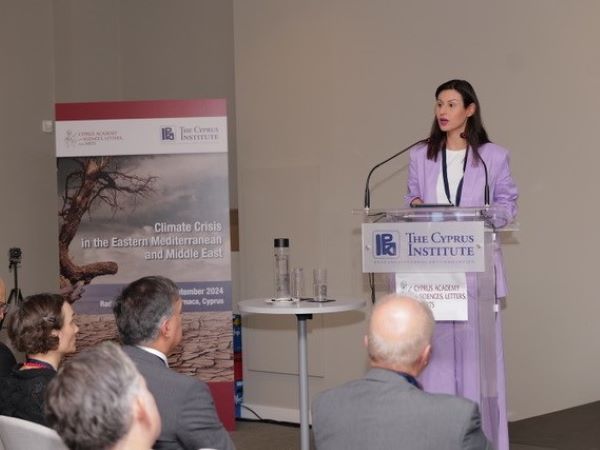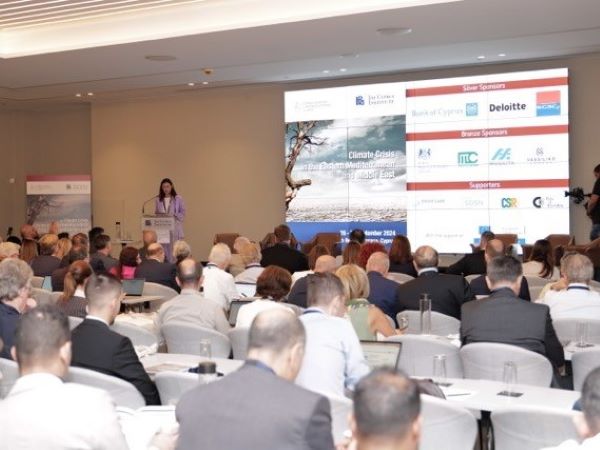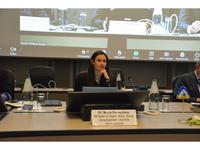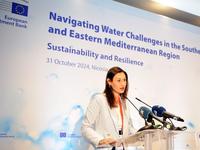Press Releases
26-09-2024 09:29
Greeting by the Minister of Agriculture, Rural Development and Environment of the Republic of Cyprus, Dr Maria Panayiotou, at the International Conference "Climate Crisis in the Eastern Mediterranean and the Middle East"
Honourable guests,
Distinguished colleagues,
Ladies and gentlemen,
It is a great privilege to stand before you today as we gather to address one of the most critical challenges facing not only our region but the entire world: climate change. In the Eastern Mediterranean and Middle East (EMME) region, we are directly impacted from climate crisis. Rising temperatures, erratic rainfall patterns, prolonged droughts, and a strain on natural resources are no longer distant threats. They are realities that demand our immediate and coordinated response.
As the Minister of Agriculture, Rural Development, and Environment of the Republic of Cyprus, I want to share with you our nation’s strategic response to the climate crisis. Our efforts are targeted on two essential and interconnected pillars: climate mitigation and climate adaptation.
Let me begin by emphasising our efforts on mitigation. Cyprus is fully committed to achieving its decarbonisation goals as outlined in our National Energy and Climate Plan 2021-2030. This comprehensive plan provides a clear roadmap, setting ambitious targets to reduce greenhouse gas emissions, enhance energy efficiency, and significantly increase the share of renewable energy in our economy. Our vision is to transition to a carbon-neutral society, with cleaner energy sources and more sustainable practices at every level.
The National Energy and Climate Plan is a transformative project that impacts on every sector ‒ energy, transport, agriculture, waste management, and urban planning and land use. One of its central aims is to reduce Cyprus’ reliance on fossil fuels by expanding the use of solar and wind energy. We are making significant progress in promoting solar photovoltaic (PV) systems, which are particularly well-suited to our sunny climate. Moreover, we are encouraging the use of energy-efficient technologies in buildings and transportation systems to lower emissions.
The transition to a circular economy is another critical component of our National Energy and Climate Plan, focusing on minimising waste and maximising the circular economy. This includes waste reduction strategies in agriculture, where the treatment of animal waste is being adopted to reduce methane emissions, a potent greenhouse gas. We are also working in improving recycling infrastructures and reduce the amount of waste that ends up in landfills.
I would be remiss not to acknowledge the challenges we face on this path. Transitioning to a carbon-neutral society requires substantial investment, technological innovation, and public commitment in embracing new practices. The scale of this transformation is unprecedented, and while we are fully committed in meeting our targets, we must also recognise that this journey will have its difficulties.
However, as we move forward, I remain confident in Cyprus' ability to adapt and innovate. We have made important strides in promoting renewable energy, but the full infrastructure necessary for a complete transition is under development. The modernisation of our energy grid and transportation systems will require not only significant financial resources but also cooperation at both political and public/private levels to propel these efforts forward.
Yes, challenges lie ahead but the commitment of our government, alongside with the readiness of the private sector and the will of the Cypriot people, remains steady. We will push forward, determined to come as close as possible to the goals we have set. Because progress is not measured by perfection, but by the relentless pursuit of a better, more sustainable future for all.
While mitigation is crucial for reducing the long-term risks of climate change, we must also focus on adapting to the immediate impacts that are already upon us. Cyprus is no stranger to water scarcity, extreme heat, and land degradation, and these challenges are only expected to intensify as climate change progresses. This is where our National Adaptation Strategy comes into play.
The National Adaptation Strategy, which is currently undergoing a comprehensive revision, is designed to address Cyprus' unique vulnerabilities. It focuses on building resilience across critical sectors, including water management, agriculture, biodiversity, land use and infrastructure. Adaptation is not a secondary issue; it is an urgent necessity. We must prepare for the changing climate and ensure that our natural resources, communities, and economy can withstand the impacts that are already being felt.
Water scarcity is one of the most pressing issues facing Cyprus today. With rainfall patterns becoming increasingly erratic and droughts lasting longer, we have had to rethink our approach to water management. Our Drought Management Plan (DMP) is a key component of this, ensuring the sustainable use of our limited water resources. We are focusing on recycling wastewater for irrigation and domestic use, using more efficient systems in water supply, increasing the capacity of desalination plants, and promoting rainwater harvesting.
Our agricultural sector, which relies heavily on water, has had to adapt significantly. We are implementing efficient irrigation systems, encouraging the use of drought-resistant crops, and supporting soil conservation practices that help retain moisture. These actions are essential to maintain agricultural productivity and ensure food security in a climate-stressed future.
While we are making progress, the challenges are immense. Water shortages will continue to threaten our agriculture, and we will need to further innovate to ensure the sustainability of food production. Public awareness campaigns and incentives for water conservation are crucial to achieving these goals, but it will require the cooperation of every citizen, farmer, and business.
Beyond water management, our agricultural sector is adapting to the changing climate in other ways. We are promoting climate-smart agriculture by encouraging practices such as crop rotation, no-till farming, and the incorporation of compost into the soil to improve soil health and reduce erosion. Healthy soils are not only vital for agriculture but also play a key role in carbon sequestration, helping to mitigate some of the impacts of climate change.
The protection of our natural ecosystems is also a priority. The Ministry is working to implement measures to combat desertification, a growing concern in Cyprus. These include reforestation projects, the use of plant barriers to prevent soil erosion, and the sustainable management of agricultural land to protect its long-term viability.
It is important to stress that mitigation and adaptation are not competing priorities but two sides of the same coin. Reducing emissions through the National Energy and Climate Plan is essential to limit future climate risks, while adapting to the changes already underway is critical to protect our economy and communities today. Both efforts must move forward simultaneously if we are to build a resilient future for Cyprus.
Our National Energy and Climate Plan gives us a clear roadmap for decarbonization, while the National Adaptation Strategy ensures that we are ready to face the immediate challenges of climate change. Together, these plans represent Cyprus’ comprehensive response to the climate crisis, but we must remain flexible, realistic, and prepared to adjust our approach as we move forward.
Ladies and gentlemen,
As I conclude, let me emphasise that Cyprus cannot fight climate change alone. The challenges we encounter are shared across the region, and the Eastern Mediterranean and Middle East Climate Change Initiative is a testament to our commitment to regional collaboration. By working together with our neighbours, we are building synergies to better understand and mitigate the unique climate challenges we collectively face. Through shared knowledge, scientific cooperation, and coordinated action, we can achieve more together than any one country could on its own.
In the coming months, our goal is to strengthen regional cooperation with neighbouring countries to tackle the severe impacts of climate change in the Eastern Mediterranean and Middle East. This initiative, which the President of the Republic will elaborate on shortly, is key to ensuring our collective resilience and preparedness.
The climate crisis is indeed daunting, but it is not insurmountable. The challenges ahead are significant, but with determination, innovation, and cooperation, we can rise to meet them. The actions we take today – both in mitigation and adaptation – will shape the future of our country and our region for generations to come. Cyprus is committed to leading by example, balancing ambition with realism, and pushing forward with the necessary actions to ensure a sustainable, resilient, and prosperous future for all.
In conclusion, allow me to extend my heartfelt congratulations to the organisers, the Cyprus Academy of Science, Letters and Arts, and the Cyprus Institute, for organising this successful conference. I also wish to express my sincere thanks to all of you, the distinguished guests, for your presence here today. Your participation reflects a shared commitment to finding solutions, exchanging knowledge, and working together toward a more sustainable and resilient future.
Thank you, and I wish you all a productive and insightful conference.
(EFys/AS)
Relevant Press Releases
